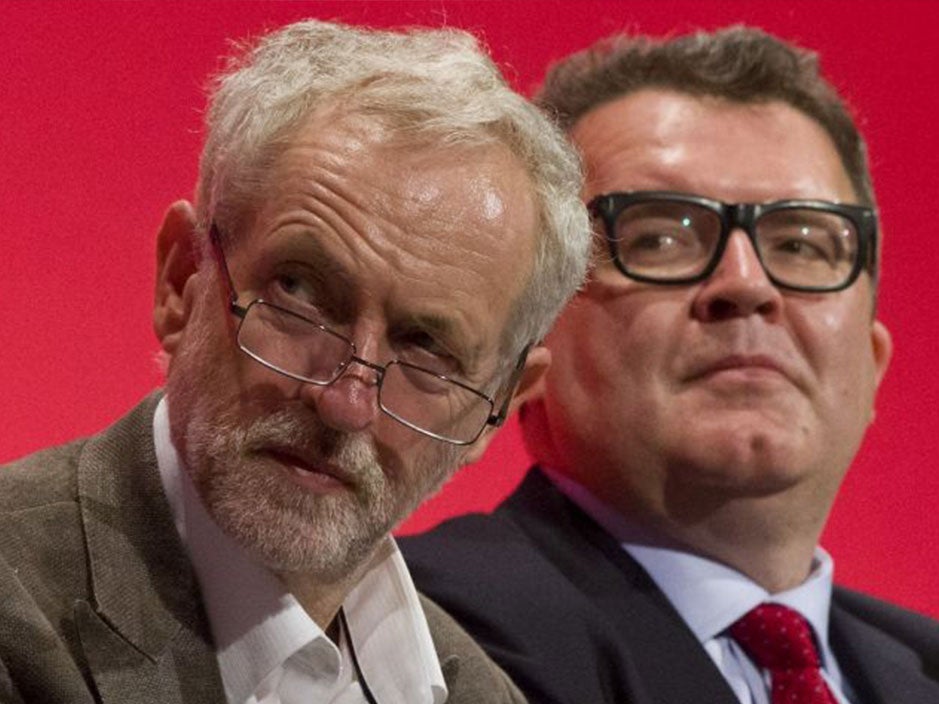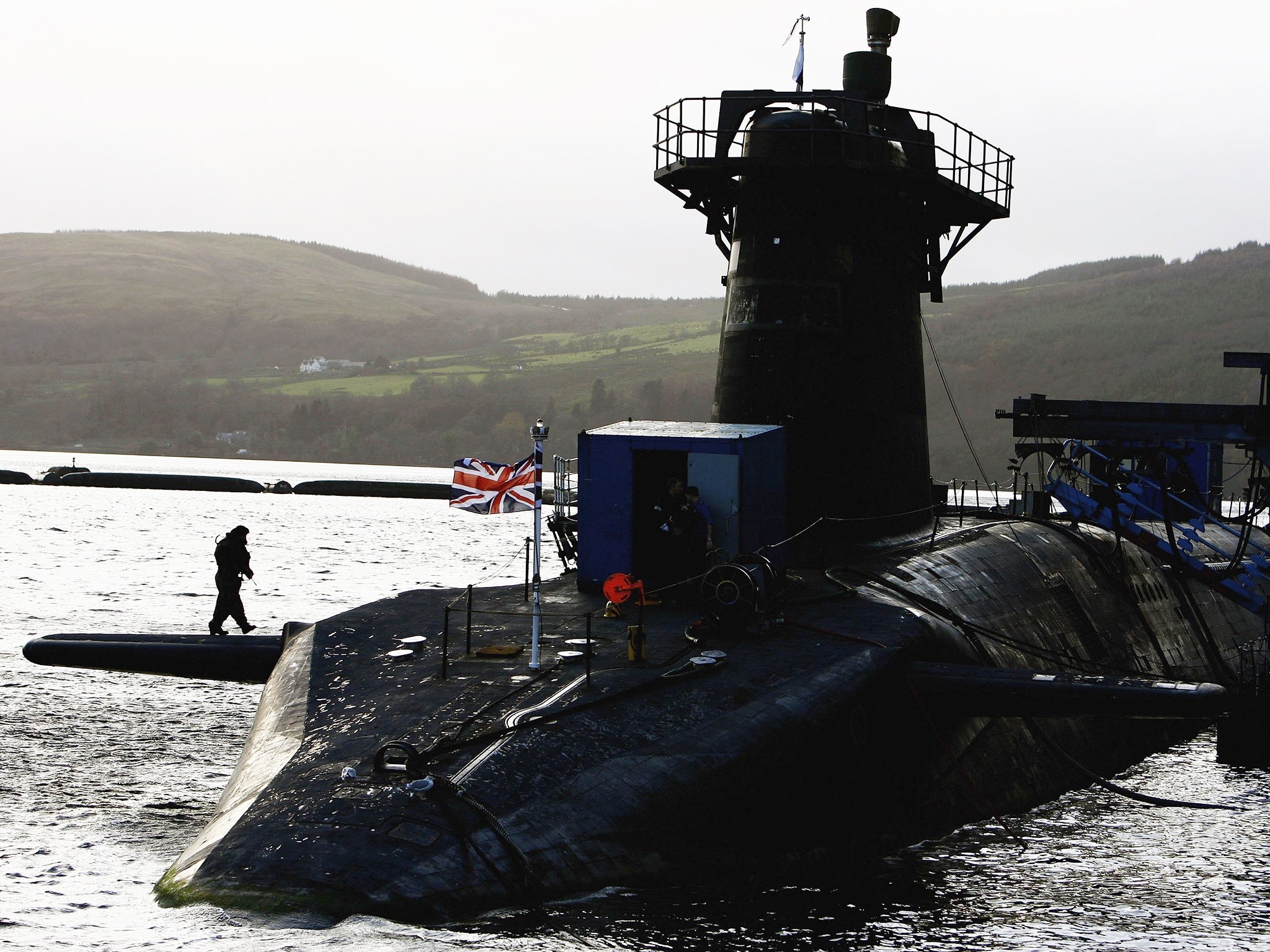Jeremy Corbyn loses the battle on Trident after trade unionists side with Labour MPs to block the move
Unions and MPs block proposal to debate policy on nuclear deterrent at conference

Jeremy Corbyn has suffered the first major defeat of his leadership after trade unionists turned on him and sided with Labour MPs to block moves to tear up the party’s policy on Trident.
In a significant setback for the new leader’s policy platform, the party’s conference in Brighton overwhelmingly voted to block a debate on Britain’s nuclear deterrent that was due to be held on 28 September.
The vote came despite behind-the-scenes attempts by senior members of Mr Corbyn’s staff to get the issue on the conference agenda.
Last night, one senior Labour official described the decision not to discuss Trident as “a vote for sanity” and said it sent a powerful message on the limits of Mr Corbyn’s power to influence party policy.
“Jeremy naively thought there was going to be a vote and he was going to win it,” one said. “But then the unions made clear that they wouldn’t back him and he would lose. After that, his people spent all day desperately trying to row back and stop the vote from happening.”
The Independent understands that behind the scenes senior members of Mr Corbyn’s staff made significant efforts to get Trident on the conference agenda.
His deputy chief of staff contacted the party’s conference arrangements committee asking it to bend rules and allow Trident to be debated, while the left-wing Campaign for Party Democracy group got a motion passed through Labour’s national executive committee to make the debate and vote more likely.
But when the ballot of party members on which motions should be discussed by conference was announced on 27 September it was supported by only 7 per cent of delegates. The unions also overwhelmingly voted against discussing Trident – with only 0.16 per cent backing the move.

One Labour source said the failure of the Trident motion was due to a behind-the-scenes lobbying operation by Labour MPs to persuade their party associations not to back the vote.
However another said that after discussions with the unions Mr Corbyn’s staff had called round their supporters urging them not to vote for a debate because they knew they could no longer win.
“They were terrified that if they lost the vote the issue would be off the agenda for years to come,” one source said. “It was a tactical retreat.”
Senior sources in the Corbyn campaign claimed however that it was a vindication of the new leader’s approach to renewing democracy within the party.
They said there had been no attempt to force Trident on to the conference agenda or influence the debate, adding: “There is strange anomaly going on. The media are obsessed by Trident but the delegates are more interested in talking about issues that affect workers. The truth is that people wanted to talk about other things.”
Earlier on 27 September, Mr Corbyn spoke of his commitment to continuing to push his approach on Trident.
The rejection of a debate and vote on Trident means that Labour is still officially committed to renewing the deterrent. This means that Shadow Cabinet members who favour its renewal, led by deputy leader Tom Watson and the shadow Foreign Secretary, Hilary Benn, will say they have the right to vote in favour of Trident when it comes up for debate in Parliament next year.
“We are going to have to discuss it and debate it and come to a philosophical solution to it,” Mr Corbyn said. “But I understand colleagues’ views. I hope to persuade them that a nuclear-free world is a good thing, that fulfilling our obligations under the nuclear non-proliferation treaty and promoting a nuclear weapons convention is a good thing.
“There are many people, military thinkers, who are very concerned, indeed opposed, to Trident because they don’t see it as part of modern security or defence. They don’t see any situation in which Trident would become an option you would think about using. This is a weapon of mass destruction.”
Mr Corbyn suggested it would not be “a disaster” if there were two different opinions within the party, but added: “I will do my persuasive best to bring them around to my view.”
Len McCluskey, the general secretary of the Unite union, which has thousands of members in the defence industry, welcomed the decision not to debate Trident.
“This is an open and democratic party and the members at conference have decided to discuss the issues that they want to debate this week,” he said. “These are important issues like the NHS, the refugee crisis, mental health and housing.”
But the SNP’s deputy leader, Stewart Hosie MP, said the decision not to debate Trident meant “Jeremy Corbyn’s entire credibility is on the line”.
He said: “If Jeremy Corbyn cannot change Labour’s position on Trident, he will either have to vote in favour of Trident renewal, against his own long-held views, or we will be faced with the farcical situation of the Labour leader defying his own party whip.”
On the agenda: Conference highlights
Jeremy Corbyn’s keynote party leader’s speech on 29 September, where he is expected to make an announcement on plans to renationalise the railways, all the more pertinent for delegates who had to use a rail replacement bus service to attend the conference on Sunday due to engineering works.
Future Challenges for the UK’s Defence and Security today with the shadow Defence Secretary Maria Eagle MP interviewed by Sky News presenter and former political and defence correspondent Niall Paterson as vote on Trident at the conference is rejected.
Debating a Question of Trust – public protection in a liberalising market with the shadow Lord Chancellor and Tony Blair’s former flatmate, Rt Hon Lord Falconer of Thornton QC on 29 September.
Sadiq Khan explains on 30 September why he is the best London Mayoral candidate and can defeat Zac Goldsmith.
Join our commenting forum
Join thought-provoking conversations, follow other Independent readers and see their replies
Comments
Bookmark popover
Removed from bookmarks